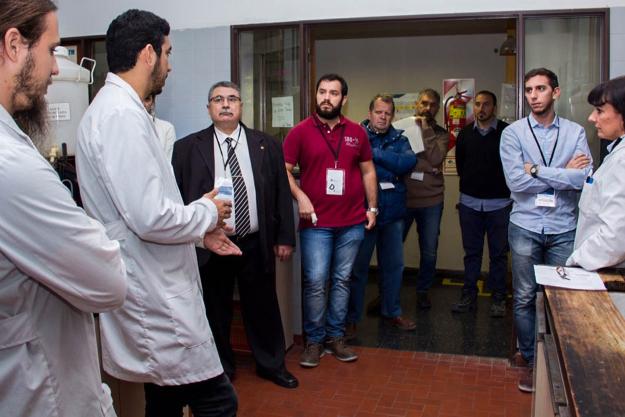
Participants on a course on chemical safety and security management in laboratories for member states in the Latin America and Caribbean region
THE HAGUE, the Netherlands — 15 May 2017 — laboratory personnel gained in-depth knowledge needed to nurture a culture of safety, security and responsibility in research and academia, during a course on chemical safety and security management in laboratories for member states in the Latin America and Caribbean region, held from 24 to 28 April in Buenos Aires, Argentina.
The course was sponsored by the Organisation for the Prohibition of Chemical Weapons (OPCW), the Instituto Nacional de Tecnología Industrial (INTI), and the Argentinian Government, and aimed at enhancing the capacity of laboratories in the region to promote a culture of safety and security.
Key aspects of the programme included theoretical lectures on various policy and practical aspects related to the Organisation and the management of lab infrastructures. Particular emphasis was placed upon waste management, personal protection measures, emergency management, toxicology and regulations, management of toxic chemicals, and the Global Harmonized System (GHS). The theoretical programme was followed by guided tours to various sectorial laboratories of (INTI) where participants observed safety measures in place and discussed them with the INTI staff involved.
The programme was conducted at INTI facilities, in Spanish, and was attended by 12 participants from El Salvador, Peru, Guatemala, Chile, Brazil, Uruguay, Costa Rica, Venezuela, Peru, Ecuador, and Panama and 32 local participants. Each participant had a professional background in chemistry and is currently working on the application of occupational safety in public and private entities.
The course is one of many new international cooperation programmes the OPCW has tailored to scientists working in various fields of chemistry. It was well received by participants, organisers and local authorities.
Victor Yanssen from the Training Department of the Superintendence of Labor Risks of Argentina said the level of detail the course went into on a regional and international level, gave him new insights into how Argentina could strengthen its local safety and security frameworks. Marcos Salazar, Chemist, Professor at the University of Panama, and Member of the Laboratories of the Center for Research and Information on Medicines and Toxics said that the most useful elements of the programme for him were the technical explanations and demonstrations of how to implement and maintain optimum laboratory safety and security on a practical day-today level.
The closure of the course was followed by a solemn ceremony of the celebration of the 20th Anniversary of the OPCW, attended by the representatives of the Ministry of Foreign Affairs of Argentina and other guests. The ceremony featured speeches from the Vice-Chancellor, H.E. Mr Pedro Villagra Delgado, and a representative of the OPCW, and featured OPCW’s 20th anniversary video and a video message of progress from the Director-General, Ambassador Ahmet Üzümcü.
Background
As the implementing body for the Chemical Weapons Convention, the OPCW oversees the global endeavour to permanently and verifiably eliminate chemical weapons. Since the Convention’s entry into force in 1997 – and with its 192 States Parties – it is the most successful disarmament treaty eliminating an entire class of weapons of mass destruction.
To date, nearly 95 per cent of all chemical weapon stockpiles declared by possessor States have been destroyed under OPCW verification. For its extensive efforts in eliminating chemical weapons, the OPCW received the 2013 Nobel Prize for Peace.
